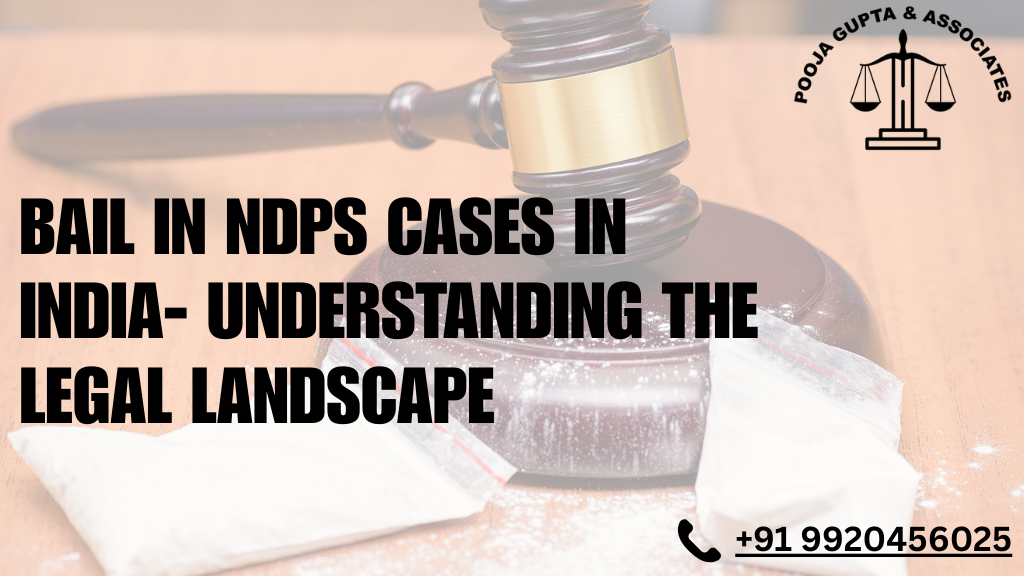The Narcotic Drugs and Psychotropic Substances (NDPS) Act, 1985, is a stringent legislation aimed at curbing drug-related offenses in India. One of its most debated provisions pertains to bail, which is notably restrictive compared to other criminal statutes. This article delves into the intricacies of bail under the NDPS Act, elucidating the legal framework, judicial interpretations, and practical implications.
1. Legal Framework: Section 37 of the NDPS Act
Section 37 of the NDPS Act imposes stringent conditions for granting bail, particularly for offenses involving commercial quantities of narcotic drugs or psychotropic substances. The section stipulates that:
- Offenses Covered: It applies to offenses under Sections 19 (embezzlement of opium by cultivator), 24 (external dealings of narcotic drugs and psychotropic substances), and 27A (financing illicit traffic and harboring offenders), along with offenses involving commercial quantities.
- Conditions for Bail: Bail can only be granted if:
- The public prosecutor has been given an opportunity to oppose the application.
- The court is satisfied that there are reasonable grounds to believe that the accused is not guilty of the offense and is not likely to commit any offense while on bail.
These conditions significantly limit the scope for granting bail in NDPS cases.
2. Judicial Interpretations and Precedents
Indian courts have consistently upheld the stringent provisions of Section 37, emphasizing the seriousness of drug-related offenses. Notable judicial pronouncements include:
- Union of India v. Niyazuddin & Anr. (2018): The Supreme Court reiterated that the twin conditions under Section 37 must be satisfied before granting bail. The court emphasized that the overlap between the provisions of the NDPS Act and the Code of Criminal Procedure (CrPC) necessitates that the former must prevail.
- Union of India v. Thamisharasi & Ors. (1995): The Supreme Court clarified that the limitations on the power to release on bail in Section 437 Cr.P.C. are restrictions, whereas the limitations under Section 37 of the NDPS Act are conditions precedent, meaning the accused shall not be released on bail unless the court is satisfied that there are reasonable grounds to believe that the accused is not guilty.
These rulings underscore the judiciary’s commitment to upholding the stringent bail provisions under the NDPS Act.
3. Anticipatory Bail in NDPS Cases
Anticipatory bail, as provided under Section 438 of the CrPC, is generally not granted in NDPS cases. The Supreme Court has observed that anticipatory bail is rarely granted in such cases due to the severity of the offenses and the potential for tampering with evidence. This stance aligns with the legislative intent to deter drug-related crimes through stringent legal provisions.
4. Default Bail and Procedural Delays
Under Section 167(2) of the CrPC, an accused is entitled to default bail if the charge sheet is not filed within the stipulated time frame. However, in NDPS cases, courts have held that the absence of a chemical analysis report does not entitle the accused to default bail if the charge sheet is otherwise complete. The Calcutta High Court, in a recent judgment, emphasized that the filing of a supplementary charge sheet with the forensic report is permissible and does not violate the statutory time limit.
5. Bail in Cases Involving Small or Intermediate Quantities
While Section 37 imposes stringent conditions for granting bail in cases involving commercial quantities, courts have occasionally relaxed these provisions in cases involving small or intermediate quantities. The Punjab & Haryana High Court noted that the bar on granting bail under Section 37 can be relaxed when the contraband quantity is marginally above the commercial limit. However, such instances are exceptions rather than the rule.
6. Role of Legal Counsel in NDPS Cases
Given the complexity and severity of NDPS cases, it is imperative for the accused to engage experienced legal counsel. A proficient lawyer can:
- Assess the Case: Evaluate the evidence and circumstances surrounding the arrest.
- Challenge the Prosecution’s Case: Identify inconsistencies or procedural lapses in the investigation.
- Represent the Accused Effectively: Present compelling arguments during bail hearings and trials.
In Navi Mumbai, several law firms specialize in NDPS cases, offering expert legal representation. Engaging such professionals can significantly impact the outcome of the case.
7. Conclusion
The provisions governing bail under the NDPS Act reflect the legislature’s intent to combat drug-related offenses with utmost seriousness. While the stringent conditions may pose challenges for the accused, they are designed to deter the proliferation of narcotic drugs and psychotropic substances. Understanding these legal provisions and engaging competent legal counsel are crucial steps for anyone navigating the complexities of NDPS cases in India.
For trusted legal support, choose an experienced advocate in Navi Mumbai who understands your case with precision and care. Backed by the best law firms in Navi Mumbai, Advocatepooja offers dedicated representation and reliable guidance, ensuring your rights are protected and justice is served with commitment and expertise.



